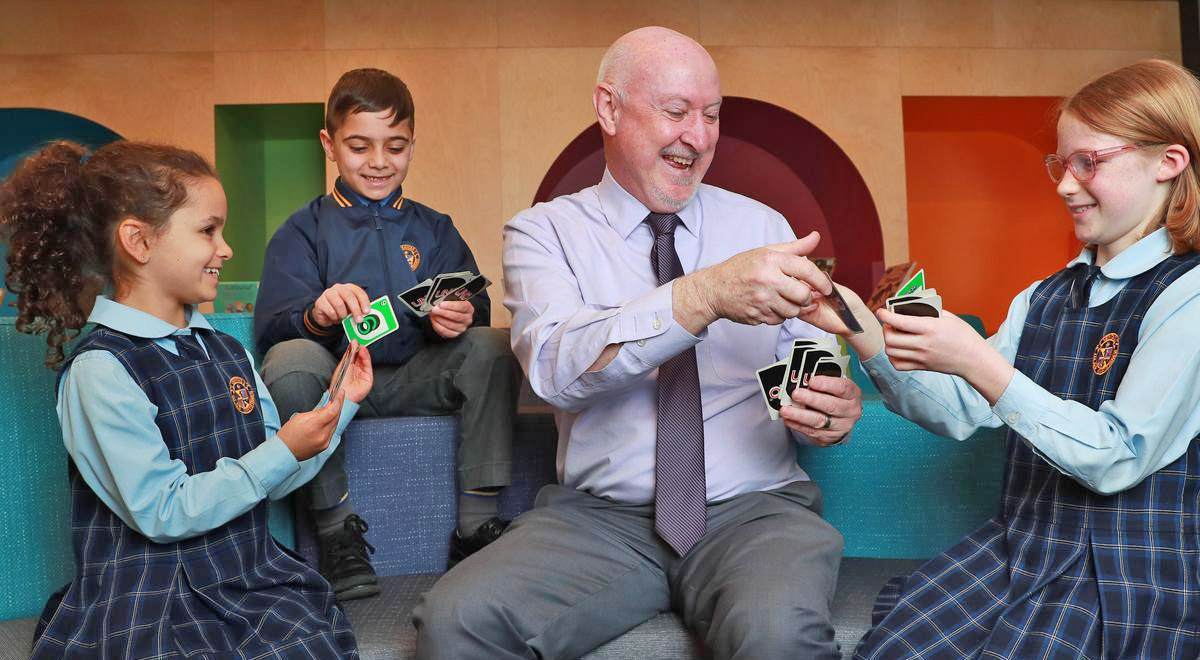Top Games to Boost Kids Emotional Intelligence
Boost your child’s emotional intelligence with engaging games like cooperative board games, role-playing games, and emotion recognition apps. These games promote teamwork, empathy, and self-awareness. Social skills card games, mindfulness games, and empathy building activities also enhance interpersonal skills. Problem-solving video games hone critical thinking and logical reasoning. Start exploring these interactive options to help your child develop essential emotional intelligence and social skills.
Key Takeaways
- Cooperative games promote teamwork, communication, cooperation, and unity.
- Role-playing games develop empathy, social skills, and conflict resolution.
- Emotion recognition apps improve emotional understanding, regulation, and conflict resolution.
- Social skills games enhance communication, emotional awareness, and conflict resolution.
- Mindfulness games cultivate self-awareness, coping skills, concentration, and stress reduction.
Cooperative Board Games

Playing cooperative board games can help children develop their emotional intelligence by encouraging teamwork and communication skills. Team building is an essential aspect of these games as they require players to work together towards a common goal, fostering a sense of unity and collaboration among children.
Through collaborating with their peers, kids learn the importance of cooperation, compromise, and supporting each other to achieve success in the game.
Moreover, communication skills are honed as children engage in discussions, strategizing, and decision-making during gameplay. Effective communication is vital to succeeding in cooperative board games as players need to convey their ideas, listen to others, and express their thoughts clearly to work harmoniously as a team.
By practicing these skills in a fun and interactive setting, children can enhance their ability to communicate effectively, understand different perspectives, and work collectively towards shared objectives.
In essence, cooperative board games provide an enjoyable platform for kids to develop essential team building and communication skills that are fundamental for building strong relationships and succeeding in various social settings.
Role-Playing Games
Let’s talk about how role-playing games can help boost your child’s emotional intelligence.
By embodying different characters and exploring various scenarios, kids can develop their empathy skills and learn to see things from different perspectives.
These games offer a fun and interactive way for children to understand emotions and practice social skills in a safe environment.
Benefits of Role-Playing
Curious about how role-playing games can enhance your child’s emotional intelligence? Role-playing benefits go beyond just entertainment; they can greatly contribute to emotional growth by improving empathy and social interaction skills.
When children engage in role-playing games, they step into different characters’ shoes, experiencing various perspectives and emotions. This process helps them develop a deeper understanding of others’ feelings and situations, ultimately fostering empathy.
Through role-playing, kids learn to communicate effectively, negotiate, and collaborate with their peers. These games provide a safe space for children to practice social interactions, understand social cues, and work on conflict resolution skills.
By engaging in imaginative scenarios, children can explore different emotions, learn to regulate their responses, and develop a sense of self-awareness. Encouraging your child to participate in role-playing activities can nurture their emotional intelligence in a fun and engaging way.
Developing Empathy Skills
Engage your child in role-playing games to cultivate their empathy skills through immersive experiences and diverse perspectives. Role-playing offers a unique opportunity for children to practice empathy exercises in a safe and controlled environment. By assuming different roles and exploring various scenarios, kids can develop a deeper understanding of emotions and perspectives beyond their own.
Through these experiences, children can enhance their emotional awareness and learn to recognize and respond to the feelings of others.
Role-playing games provide a platform for children to step into someone else’s shoes, fostering empathy and compassion. By embodying different characters and facing diverse challenges, kids can broaden their perspective and gain insights into the emotions and struggles of others.
This active engagement with different roles and scenarios encourages children to ponder alternative viewpoints and understand the impact of their actions on others.
Incorporating role-playing games into your child’s routine can be a fun and effective way to promote empathy skills and emotional awareness, helping them develop into more empathetic and understanding individuals.
Emotion Recognition Apps

Let’s chat about Emotion Recognition Apps.
These apps offer a range of features designed to help kids identify and understand emotions better.
App Features Overview
Explore the range of features available in emotion recognition apps to help children develop their emotional intelligence effectively. These apps often incorporate interactive storytelling and character development to engage young users in recognizing and understanding emotions.
Through interactive narratives, children can learn to identify various emotions portrayed by characters, enhancing their emotional recognition skills.
Moreover, these apps typically include features that promote emotional regulation and conflict resolution. By presenting scenarios where children can make decisions to manage their emotions and resolve conflicts, these apps provide a safe space for kids to practice handling different emotional situations.
This hands-on approach allows children to learn how to navigate complex emotions and interpersonal interactions in a supportive virtual environment.
Benefits for Children
These emotion recognition apps offer children a valuable opportunity to enhance their emotional intelligence through engaging narratives and interactive features. By using these apps, children can develop essential skills such as emotional regulation, cognitive development, and social interaction in a fun and interactive way.
Parent involvement is crucial when children engage with emotion recognition apps. Parents can participate in the app activities, discuss emotions with their children, and provide guidance on how to manage different feelings effectively. This involvement not only strengthens the parent-child bond but also reinforces the lessons learned from the app in real-life situations.
Emotion recognition apps also play a significant role in enhancing cognitive development. Through various challenges and activities, children can improve their problem-solving skills, critical thinking, and decision-making abilities.
Moreover, the social interaction aspect of these apps allows children to learn about empathy, communication, and understanding others’ emotions, fostering positive relationships with their peers.
Social Skills Card Games

Engaging in social skills card games can be a fun and effective way to help children develop their emotional intelligence. These games not only promote communication skills and interactive play but also enhance emotional awareness and social interaction.
Through the interactive nature of card games, children learn how to communicate effectively, express their emotions, and understand the feelings of others.
Games like ‘Emotion Charades’ or ‘Feelings Go Fish’ encourage players to act out or discuss various emotions, fostering emotional awareness and empathy. By engaging in these activities, children can practice recognizing and responding to different emotions in a safe and playful environment.
Moreover, social skills card games provide opportunities for children to work on their teamwork, cooperation, and conflict resolution abilities. Whether it’s taking turns, following rules, or resolving disputes, these games offer valuable lessons in managing social interactions.
Mindfulness Games
Mindfulness games offer a practical way for children to cultivate self-awareness and emotional regulation skills in a playful and engaging manner. By incorporating mindfulness exercises and techniques into games, kids can learn to focus on the present moment, understand their emotions, and develop coping strategies.
These games not only provide entertainment but also deliver valuable mindfulness benefits that can positively impact a child’s overall well-being.
Engaging in mindfulness practices through games can help children enhance their concentration, reduce stress, and improve their ability to manage challenging emotions. By encouraging mindfulness in a fun and interactive way, kids can learn valuable life skills that promote resilience and emotional intelligence.
Through mindfulness games, children can explore different ways to practice mindfulness, such as deep breathing exercises, body scans, or guided imagery. These activities can help kids become more attuned to their thoughts and feelings, fostering a sense of inner calm and emotional balance.
Empathy Building Activities

To further enhance children’s emotional intelligence, exploring empathy-building activities can be a valuable and impactful way to foster understanding and compassion towards others. Engaging in empathy exercises allows kids to develop a deeper sense of empathy, which is essential for healthy social interactions and relationships.
Group dynamics play a significant role in empathy-building activities, as they provide children with the opportunity to understand different perspectives and emotions within a social setting. Encouraging teamwork and communication during these activities can help children recognize and respond to the feelings of others with empathy and kindness.
Problem-Solving Video Games
Problem-solving video games offer an interactive and engaging way for children to enhance their critical thinking skills and essential emotional intelligence. These games present cognitive challenges that require strategic thinking, problem-solving, and critical reasoning to progress through levels and achieve objectives. By immersing yourself in these virtual worlds, you not only have fun but also develop crucial skills that can benefit you in various aspects of life.
When you engage with problem-solving video games, you’re presented with scenarios that demand quick thinking and thoughtful decision-making. Whether it’s solving puzzles, finding paths through obstacles, or strategizing to overcome challenges, each gameplay experience provides an opportunity to exercise your mental faculties and hone your problem-solving abilities.
Through repeated exposure to these cognitive challenges, you can train your brain to think critically, analyze situations effectively, and adapt to changing circumstances. As you tackle different problems within the game, you enhance your capacity for logical reasoning and develop a resilient mindset that can serve you well in real-world situations.
Frequently Asked Questions
Can These Games Be Played Solo or Do They Require a Group?
These games can be played solo, offering benefits like independence and self-reflection. However, they also encourage social interaction, which is essential for developing emotional intelligence through communication, empathy, and understanding others’ perspectives.
Are There Age Recommendations for These Games?
For age appropriateness, these games vary but often have recommended age ranges on the packaging or online. They cater to different developmental levels, enhancing cognitive skills and fostering emotional growth in kids.
How Long Does It Typically Take to Play Each Game?
Each game varies in duration, typically ranging from 15-45 minutes. Quick games offer benefits like engaging attention. Variety is essential to keep kids interested and entertained. It’s important to offer a mix of game lengths for best engagement.
Do These Games Require Any Additional Materials or Accessories?
To play these games, you won’t need any extra materials or accessories. If you’re looking for cost-effective alternatives, consider DIY options using common household items. Enjoy the fun and learning without breaking the bank!
Are There Any Potential Risks or Downsides to Playing These Games?
When playing these games, it is important to be mindful of potential overstimulation concerns. While they can enhance emotional intelligence, excessive screen time might impact social skills development. Balancing game time with other activities is vital.
Conclusion
Incorporating games into your child’s routine can be a fun and effective way to boost their emotional intelligence. From cooperative board games to empathy-building activities, there are plenty of options to choose from.
By engaging in these activities, kids can develop important social and emotional skills that will benefit them throughout their lives.
So why not start playing some of these games today and watch as your child’s emotional intelligence grows!

Hey there! 👋 I’m a proud mom and passionate writer, sharing my parenting journey. 📝 Join me as I navigate the ups and downs of motherhood, offering tips, advice, and a sprinkle of humor along the way. 🌟







